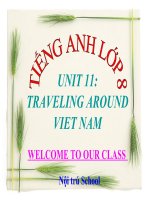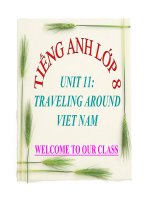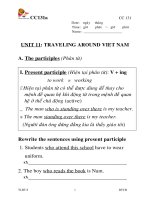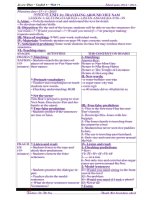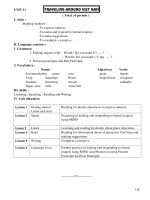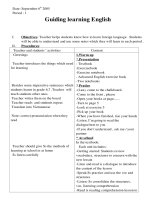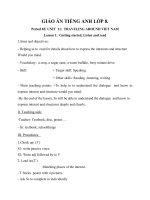AV 8 Unit 11 Traveling around Vietnam
Bạn đang xem bản rút gọn của tài liệu. Xem và tải ngay bản đầy đủ của tài liệu tại đây (88.57 KB, 20 trang )
CC131a CC 131
Date: ngày tháng
Time: giờ phút ∼ giờ phút
Name: ______________________
UNIT 11: TRAVELING AROUND VIET NAM
A. The participles (Phân từ)
Rewrite the sentences using present participle
1. Students who attend this school have to wear
uniform.
_____________________________________
2. The boy who reads the book is Nam.
_____________________________________
TLBT 8 BTCB
1
I. Present participle (Hiện tại phân từ): V + ing
to work
→
working
Hiện tại phân từ có thể được dùng để thay cho
mệnh đề quan hệ khi động từ trong mệnh đề quan
hệ ở thể chủ động (active)
_ The man who is standing over there is my teacher.
→ The man standing over there is my teacher.
(Người đàn ông đứng đằng kia là thầy giáo tôi)
CC131b
Combine each pair of sentences using present
participle (V- ing)
_ The boy is Nam. He is reading the book.
→ The boy reading the book is Nam.
1. The baby is crying for her mother. She is sitting
in a chair.
____________________________________
2. The teacher is Ms Lan. She is teaching my class.
____________________________________
3. The woman is very good at French. She is
talking to us.
_____________________________________
4. The man is very kind. He is helping my mother.
_____________________________________
5. I know the girl. She is speaking to John.
_____________________________________
6. The boy is my cousin. He is playing in the front
yard.
_____________________________________
7. Students are attending this school. They have to
wear uniform.
_____________________________________
TLBT 8 BTCB
2
CC132a CC 132
Complete the sentences using present participle
(V- ing)
_ The man (sit) next to her was an actor.
→ The man sitting next to her was an actor.
1. The girl (play) the piano is Mai.
_____________________________________
2. The teacher (teach) my class is Ms Lan.
_____________________________________
3. The man (help) the poor was very kind.
_____________________________________
4. The student (talk) to John is my best friend.
_____________________________________
5. The dog (run) along the street is Mary’s.
_____________________________________
6. The woman (wear) a skirt is a singer.
_____________________________________
7. The girl (sit) next to me was very nervous.
_____________________________________
TLBT 8 BTCB
3
CC132b
Choose the correct answer
_ We (meet / met) a stranger in the room last night.
1. We (learning / are learning) English now.
2. We (were going / going) along the street when
we saw Mary last night.
3. Lan often (visiting / visits) me.
4. John (coming / came) there last night.
5. She (having studied / has studied) English for 4
years.
6. Where is John?
_ He (reading / is reading) books in the room.
7. Did you (see / saw) Hoa last night?
8. What are you (doing / do) now?
9. The bicycle (bought / was bought) last month.
10. He suggested (to go / going) out for dinner.
11. It’s important (learn / to learn) the lesson by
heart.
12. I can (see / saw) the boy over there.
13. He used to (be / is) my best friend.
14. Would you like me (going / to go) now?
TLBT 8 BTCB
4
CC133a CC 133
Rewrite the sentences using present participle
_ The boy who reads the essay is Ba.
→ The boy reading the essay is Ba.
1. The lady who is wearing that valuable ring is
Mrs. Lan.
_____________________________________
2. The man who is sitting next to her is my friend.
_____________________________________
3. The woman who is talking to us is very good at
French.
_____________________________________
4. I know the girl who is speaking to John.
_____________________________________
5. The boy who is standing in the corner is my
cousin.
_____________________________________
6. People who is living there is ethnic minorities.
_____________________________________
TLBT 8 BTCB
5
CC133b
Rewrite these sentences using past participle
1. Most of the people who were invited to the party
didn’t come.
_____________________________________
2. The book which was bought at the bookstore is
interesting.
_____________________________________________________
3. The book which was given to me yesterday
morning was from my brother.
_____________________________________
TLBT 8 BTCB
6
II. Past participle (Quá khứ phân từ): V
ed
/ V
3
to go → gone to like → liked
Quá khứ phân từ có thể được dùng để thay
cho mệnh đề quan hệ khi động từ trong mệnh đề
quan hệ ở thể bò động (passive).
_ The toys which were made in China are cheap.
→ The toys made in China are cheap.
(Đồ chơi được sản xuất tại Trung Quốc thì rẻ.)
CC134a CC 134
Combine each pair of sentences using past
participle (V
ed
/ V
3
)
_ The old pencil is 2 dollars. It was made in Taiwan.
→The old pencil made in Taiwan is 2 dollars.
1. The girl was taken to the hospital. She was
injured in the accident.
____________________________________
2. Most of the goods are exported. They are made
in this factory.
____________________________________
3. The washing machine has been repaired. It was
broken last night.
____________________________________
4. The film was very exciting. It was directed by
Mr. George.
_____________________________________
5. The story is very interesting. It was written by
Quynh Dao.
_____________________________________
TLBT 8 BTCB
7
CC134b
Rewrite the sentences, using past participle
_ The hat which was bought at the supermarket is
yellow.
→ The hat bought at the supermarket is yellow.
1. Most of the people who were invited to his
birthday party are rich.
____________________________________
2. The lady who was taught English is Ms Lan.
____________________________________
3. The air-conditioner which was broken last night
is bad.
_____________________________________
4. The film which was directed by Mr. George was
very exciting.
_____________________________________
5. The house which was built by them was
beautiful.
_____________________________________
TLBT 8 BTCB
8
CC135a CC 135
Rewrite these sentences using past participle
_ A cap (buy) at the store is very expensive.
→ A cap bought at the store is very expensive.
1. The washing machine (break) last night is bad.
_____________________________________
2. The novel (write) by Mr. John is good.
_____________________________________
3. The cars (make) in China are cheap.
_____________________________________
4. The vegetables (buy) at the supermarket are
fresh.
_____________________________________
5. The cat (injure) last night died.
_____________________________________
6. The umbrella (buy) yesterday was taken away.
_____________________________________
7. The food (cook) by my mom is delicious.
_____________________________________
TLBT 8 BTCB
9
CC135b
Choose the best answer
1. How _______ you go to school yesterday?
_ By bus.
a. do b. did c. were d. was
2. The bridge _______ in 2008.
a. is built b. building
c. built d. was built
3. What is she _______ at the moment?
a. doing b. do c. does d. did
4. They _______ in this city since 2006.
a. lived b. live
c. have lived d. living
5. What _______ when I phoned you last night?
a. were you doing b. are you doing
c. did you do d. was you doing
6. I am happy _______ you here.
a. seeing b. to see c. saw d. seen
7. The vase _______ on the shelf is very beautiful.
a. stands b. is standing
c. standing d. stood
TLBT 8 BTCB
10
CC136a CC 136
Date: ngày tháng
Time: giờ phút ~ giờ phút
UNIT 11: TRAVELING AROUND VIET NAM
B. Request with “Would / Do you mind…?”
Rewrite these following sentences using
structures “Would / Do you mind + V_ ing…?”
1. Please close the door.
_____________________________________
2. Please take a photo.
_____________________________________
TLBT 8 BTCB
11
Cấu trúc này thường được dùng để yêu cầu
người khác làm việc một cách lòch sự.
_ Would / Do you mind opening the window?
(= Please open the window.)
(Phiền bạn mở giùm cửa sổ. / Vui lòng mở giùm
cửa sổ.)
_ Would / Do you mind not smoking?
(= Please don’t smoke.)
(Xin đừng hút thuốc.)
Would / Do you mind + V_ ing …?
CC136b
Complete the sentences with the correct form of
the verbs from the box
_ Would you mind showing me how to use this
machine?
1. Do you mind _________ the kitchen?
2. Would you mind _________ the clothes?
3. Would you mind not _________?
4. Would you mind _________ me to do
homework?
5. Would you mind _________ your homework?
6. Do you mind _________ your address on this
paper?
7. Would you mind not _________ me that
question?
8. Would you mind _________ your car away?
9. Would you mind _________ the meal?
TLBT 8 BTCB
12
smoke wash show clean do
help ask write take cook
CC137a CC 137
Rewrite these sentences using the structure
“Would you mind (not) + V_ ing…?”
_ Please open the air conditioner.
→ Would you mind opening the air conditioner?
1. Please don’t smoke.
_____________________________________
2. Could you turn the computer off?
_____________________________________
3. Please put your coat on the table.
_____________________________________
4. Could you please tell me the truth?
_____________________________________
5. Please don’t make much noise.
_____________________________________
6. Will you borrow this book from the library for
me?
_____________________________________
7. Could you lend me some money?
_____________________________________
8. Could you close the window?
_____________________________________
TLBT 8 BTCB
13
CC137b
Read the following text, and answer the
questions
NHA TRANG
When people talk about Nha Trang, the biggest city
in Khanh Hoa province. They often think of a
tropical paradise. Nha Trang is a famous seaside
resort. It has a long coastline with beautiful white
sandy beaches.
In the morning and afternoon, tourists can take part
in various fascinating outdoor activities such as
mud bathing, swimming.
In addition, tourists can spend an evening visiting a
fishing village, where they could get a taste of the
local seafood. There are crabs, shrimps, lobsters ….
and several other kind of fish - all are fresh and
delicious.
Questions:
1. Is Nha Trang the biggest city in Khanh Hoa
province?
_____________________________________
2. What does the beaches look like?
_____________________________________
3. What can tourists do in the morning and
afternoon?
_____________________________________
TLBT 8 BTCB
14
CC138a CC 138
Rewrite the following sentences without
changing their original meanings
_ She has learnt physics for three years.
→ Physics has been learnt for three years.
1. Clean the floor, please.
Would you mind _______________________
2. Would you mind opening the window?
Do you ______________________________
3. Please don’t make much noise.
Would you mind _______________________
4. They ate much food.
Much food ___________________________
5. They repaired the chair yesterday.
The chair ____________________________
6. I always keep the window open to let fresh air
in.
I always keep the window open so as ______
_____________________________________
TLBT 8 BTCB
15
CC138b
Make sentences using the structures “Would / Do
you mind if …?”
_ Shall I choose that shirt?
→ Would you mind if I chose that shirt?
1. Can I move the table to the living room?
Do ___________________________________
2. Can I ask you a personal question?
Would ________________________________
TLBT 8 BTCB
16
Cấu trúc này thường được dùng để hỏi xin phép
một cách lòch sự.
_ Would you mind if I opened the window?
(Bạn có phiền không nếu tôi mở cửa sổ?)
Câu trả lời “No” (không) hoặc “Not at all”
(không có chi) được dùng để cho phép trong cấu
trúc “Would / Do you mind if…?”
Would you mind + if clause (past tense)…?
Do you mind + if clause (present tense)…?
CC139a CC 139
Make sentences using the structures “Would / Do
you mind if …?”
_ Could I smoke?
→ Would you mind if I smoked?
1. May I sing a song?
Do __________________________________
2. Could I borrow your pencil?
Do __________________________________
3. Could I open the window?
Would _______________________________
4. May I turn off the air conditioner?
Do _________________________________
5. Can I turn on the radio?
Would _______________________________
6. May I turn the air conditioner off?
Do__________________________________
7. Could I smoke here?
Would _______________________________
8. Can I sit here?
Would _______________________________
TLBT 8 BTCB
17
CC139b
Put the verbs in the brackets into the correct
tenses, using passive forms
_ It (show) will be shown to the public when it is finish.
1. _________ the bridge (build) _________ by the
end of the year?
2. The work (finish) _________ next week.
3. _________ this chair (make) _________ by you
last week?
4. Milk (bring) _________ to the house by the
milkman everyday.
5. It’s a big factory. Five hundred people (employ)
_________ there last year.
6. Originally, the book (write) _________ in
Spanish and a few years ago it (translate)
_________ into English.
7. The letter (post) _________ a week ago.
8. My car (break) _________ down yesterday.
9. This tree (plant) _________ by my sister last year.
10. The floor (clean) _________ everyday.
11. The computer (use) _________ every morning.
12. Trees (water) _________ everyday.
TLBT 8 BTCB
18
CC140a CC 140
Choose the correct answer
1. This ruler _______ of plastic.
a. was make b. was making c. was made
2. Do you mind _______ me that book?
a. pass b. passing c. passes
3. Would you mind if I _______ the TV?
a. turns on b. turned on c. turning on
4. It’s hard _______ this exercise.
a. to do b. does c. did
5. _______ you turn down the TV, please?
a. Will b. Do c. Are
6. Milk _______ to the houses by the milkman
everyday.
a. brings b. is bring c. is brought
7. She promises she _______ back in about half an
hour.
a. is b. will be c. has been
8. The tree _______ yesterday.
a. watered b. is watered
c. was watered
TLBT 8 BTCB
19
CC140b
Change into passive form
_ People speak English all over the world.
→ English is spoken all over the world.
1. I will buy some new books tomorrow.
_____________________________________
2. Nam invited Liz to the rice _ cooking festival.
_____________________________________
3. My sister cleans the room everyday.
_____________________________________
4. People play football all over the world.
_____________________________________
5. We will grow a lot of trees in the park.
_____________________________________
6. They sold this house about twenty years ago.
_____________________________________
7. I saw an accident last night.
_____________________________________
8. They don’t use this road very often.
_____________________________________
TLBT 8 BTCB
20

